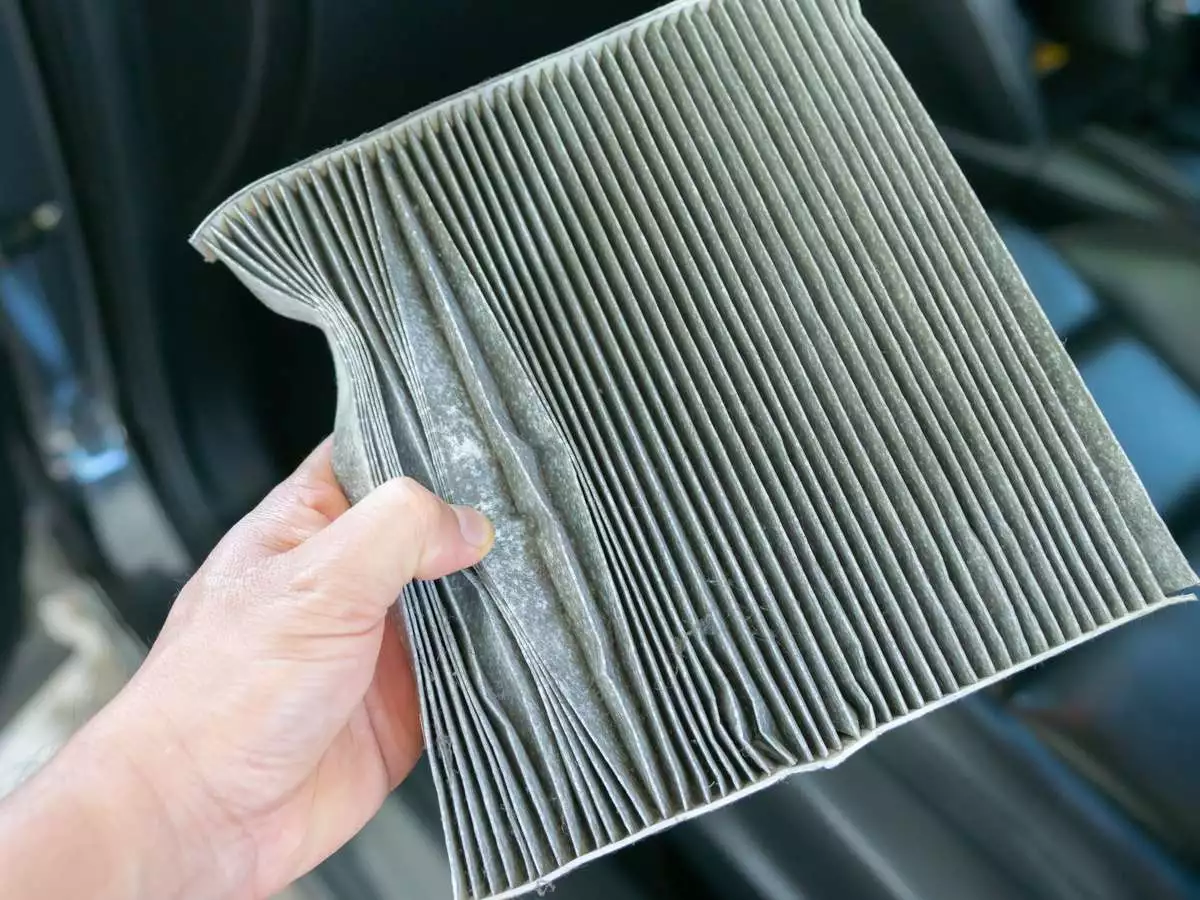Do Cars Have Air Filters? [Here’s Everything to Know!]
Air filters in cars are essential. Each filter type has a specific purpose, from cleaning the outside air that flows into the engine to ensuring you breathe fresh air when the windows are closed.
All gas-powered cars have air filters: the cabin air filter and the engine air filter. The cabin air filter cleans the car’s interior air when you use the air conditioning or heating system, while the engine air filter removes dust, dirt, and pollutants from the air that feeds into the motor.
Replacing the cabin air filter according to your car’s manual will ensure the freshest air for breathing when the windows are closed. In contrast, the engine air filter is crucial to a highly efficient engine and improved fuel consumption. Keep reading to see how each filter works to give you the best car experience.
How does the Vehicle Cabin Air Filter work?
The cabin air filter removes dust, dirt, and pollutants from the air that flows through your air conditioning and heating system. It functions similarly to the air filter in your home’s HVAC system.
As you ride in your car, the engine pulls outside air into the air intake system to help you stay warm or cool. As the air moves from the outdoors, it flows through the cabin air filter, where the allergies, pollutants, and unpleasant odors filter out.
Modern cabin air filters efficiently clean the air before it enters the car’s cabin. Since the air is pulled into the vehicle rapidly, the filters must be efficient. There are two main types of cabin air filters: the particle air filter and the two-stage air filter. Both of these work to clean and improve the quality of the air you breathe inside the car.
I’ll go over these types of cabin air filters and the benefits of a cabin air filter in more detail below.
The Particle Air Filter
This car air filter has minute holes to process out the fine and ultrafine particulate matter, including traffic pollutants, vehicular emissions, and smoke. The particle air filter has a higher efficiency rating than a HEPA filter for your home HVAC system. Some car makers utilize a nano filter composed of nanofiber coated with an activated charcoal layer.
Here are some characteristics of a particle air filter:
- They capture up to ninety-five percent of particles larger than three microns.
- Many cabin filters remove particles of less than three microns, such as allergens, bacteria, and pollen.
The Two-Stage Air Filter
Breathing freely inside your car is an integral part of enjoying the ride. An efficient cabin air filter is a crucial component of your vehicle. The two-stage air filter takes this one step further with not one but two filtration methods in one filter.
- The first layer of the two-stage air filter removes the grainy particles like mold, dust, and tire dust.
- The activated carbon second layer removes harmful gases, offensive odors, and other allergenic substances.
- Some cabin air filters have a biofunctional third layer with polyphenols for an anti-inflammatory effect.
Benefits of Your Car’s Cabin Air Filter
The cabin air filter is located in ductwork frequently found at the base of the windshield. In others, you’ll find it behind the glove box. Your car’s manual will indicate the placement of the cabin air filter. This filter delivers many benefits to your car’s interior air and comfort:
- The filter absorbs over ninety percent of allergens that can enter your car through the air conditioning and heater.
- It improves the air you breathe inside the car by removing fine and ultra-fine particles.
- Most cabin filters remove harmful gases like sulfur dioxide, ozone, and nitrogen oxide.
- The filter inhibits the entry and growth of mold and the entry of bacteria.
How To Know When Your Cabin Filter Needs Replacing
There are some clear signs to look for that indicate your car cabin filter needs a replacement. Ensuring the healthy, clean air of your car’s interior is an essential factor to a pleasant ride. In addition, not replacing the cabin air filter when needed can lead to costly damage. Here are some signs to look for:
- If you notice a strong, musty odor coming from the air vents, it can mean that your cabin air vent is clogged with dirt and dust.
- Foggy windows are a sign your cabin filter is not working correctly by circulating the inside air.
- Reduced airflow from the air conditioning or heating system means your cabin air filter needs inspection, potentially leading to a malfunction of this system.
- When your air conditioning or heating fan is loud, this is an indicator the cabin air vent could need replacing.
- The most common sign of a dirty, clogged air filter is reduced airflow from the air conditioning or heating vents.
How the Engine Air Filter Works

To operate correctly, a car engine must mix gas with oxygen to create combustion. An engine air filter ensures the air that feeds into the motor is clean and free of dirt, bugs, and other particles. If the engine air filter is dirty, the motor won’t get the air it needs, and you can experience engine damage.
There are three types of car engine air filters: paper, gauze, and filter foam. I’ll discuss these types of filters in more detail below.
The Three Types of Car Engine Air Filters
The right car air filter is essential to the proper engine operation. A dirty air filter can cause decreased fuel efficiency and engine damage from a lack of air for combustion.
Maintaining a clean engine air filter is not expensive and will contribute to your car’s efficiency. Here are the three engine air filter types:
- Paper engine air filters are inexpensive and the most commonly used. You should plan to replace a paper engine air filter every 30,000 miles or more often if you live in a dusty area.
- Gauze engine air filters are washable and reusable. There are two kinds of gauze air filters for cars, and the most commonly used gauze engine air filter has an oil coating. You should plan to clean this air filter every 5,000 miles. However, a synthetic gauze engine air filter requires a proprietary cleaning solution every 15,000 miles.
- A protective foam sometimes wraps an engine air filter to add an extra barrier for dust and particles. This filter foam is great for people who live in big cities or anywhere with a high concentration of dirt, exhaust, and dust in the air.
Your car’s manual will indicate the air filter type and recommend changing intervals for your car’s make and model.
The Benefits of an Engine Air Filter
Pollutants and dirt float around in the air we breathe. These particles can cause unnecessary wear and tear on your car’s engine if left unchecked by a clean air filter. Car designers have used an engine air filter to import clean air to the motor so your car operates as efficiently as possible.
Consider these benefits of regularly replacing your engine’s air filter:
- Improved performance and efficiency accompany a clean engine air filter. Some studies show that engine performance and fuel consumption improve by over fifteen percent when the air filter is clean.
- A clean air filter prolongs the life of the car engine. The clean air entering the car motor reduces the friction of the pistons and cylinders, extending the engine’s life.
- The low cost of an engine air filter makes this replacement affordable. Replacing the engine air filter does not cost much but contributes significantly to the car’s performance.
Signs You Need To Replace the Engine Air Filter
A dirty air filter will restrict airflow to the motor, lowering your car’s performance and fuel efficiency. You can maintain optimal engine workings and longevity with something as simple as replacing the air filter according to your car’s manual instructions. Here are some signs your engine air filter needs replacement:
- Engine misfires signal that the motor isn’t getting the air it needs. The soot and dirt will build up on the spark plugs, so they can’t deliver the spark the engine needs. This results in jerking and misfires as you try to drive the car.
- A clogged engine air filter will reduce the car’s driving efficiency. When you notice slow acceleration, this might signal the air filter is dirty.
- Engine sputtering can indicate you need a new or cleaned air filter. When the air filter needs cleaning or replacing, the car engine can make strange noises.
- Your car should move without hesitation when accelerating, but a clogged air filter will make quick acceleration difficult. Air movement into the engine is an essential part of the motor design, but a dirty air filter will impede the air, causing the engine to be sluggish.
- If you or a mechanic inspect the air filter and see dirt and other particles, you should replace the air filter. A clean air filter will not look dark and have visible signs of dirt.
How To Replace the Cabin and Engine Air Filters
The cabin air filter and the engine air filter are components of the car design that are simple to maintain and contribute significantly to your driving and riding experience.
Changing out the old, dirty filters for a new filter is a relatively easy task, but if you don’t feel comfortable trying, an auto service center can make the switch quickly.
Here are some Youtube videos on how to change each filter:
Also check out this video that provides details on how to replace the engine filter of your car!




![Car AC Cold Only When Driving? [Here’s Why And How to Fix!]](https://vehicleuniversity.com/wp-content/uploads/2023/01/exhausted-young-woman-suffer-from-heat-inside-car-2022-08-01-04-58-09-utc-768x576.webp)
![How To Purge Air From Car’s AC System [Full Guide!]](https://vehicleuniversity.com/wp-content/uploads/2023/01/auto-mechanic-working-in-garage-repair-service-lo-2021-12-27-15-44-26-utc-768x513.webp)
![What Kind of Acid is in a Car Battery? [With Explanation!]](https://vehicleuniversity.com/wp-content/uploads/2023/01/daily-car-check-check-out-the-distilled-car-batter-2021-08-26-17-53-37-utc-768x576.webp)
![How Much Does a Car AC Leak Repair Cost? [Full Guide!]](https://vehicleuniversity.com/wp-content/uploads/2023/01/asian-automotive-mechanic-with-blue-uniform-explai-2022-01-19-00-18-40-utc-768x512.webp)
